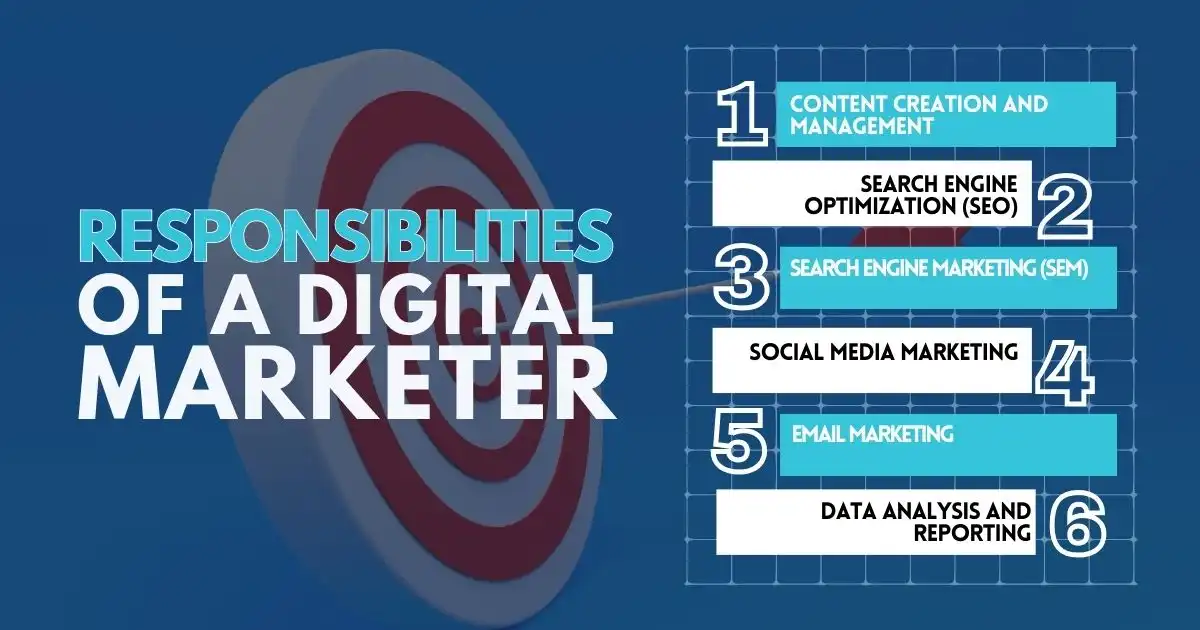Every business, big or small, needs a strong online presence today.
Digital marketers have different tasks each day based on their job, the company they work for, and the industry they’re in. Digital marketing involves using the internet to reach people. Companies use it to connect with their audience, advertise their products or services, and meet their business goals.
Remember, a strong online presence and tools like SEO are essential for attracting customers and growing your business.
Digital Marketing: What You Should Know
Digital marketing is all about using the internet and electronic devices to promote products, services, or brands. This can include things like websites, social media, search engines, mobile apps, emails, and text messages. It’s a way for businesses to connect with people online.
The goals of digital marketing can be different for each company. Some might want to get their brand known, reach more customers, share information, get people interested in their products, turn website visitors into buyers, or make more money. Overall, it’s about finding ways to engage with people and grow the business.
Responsibilities of a Digital Marketer
Digital marketers have different tasks depending on their job role and the area they focus on. Here are some common responsibilities for junior and mid-level digital marketers in different specializations:

1. Content Creation and Management
This area focuses on planning, creating, and sharing content that engages the audience and promotes the brand. Content can include blog posts, social media updates, videos, and website copy.
Common tasks for a content creator or manager include:
- Developing content strategies – Planning what type of content to create and when to post it, based on the audience’s interests and the company’s goals.
- Writing blog posts – Creating articles related to the company’s products, services, or industry trends to attract readers and increase traffic to the website.
- Creating website copy – Writing engaging text for landing pages, product pages, and promotional offers.
- Managing content on different platforms – Uploading and scheduling content on the company’s website, social media accounts, and email newsletters.
Example: A content manager might develop an article about “Top 5 Tips for Better Baking” to share on a bakery’s website, attracting customers interested in baking tips.
2. Search Engine Optimization (SEO)
SEO focuses on improving a website’s visibility on search engines like Google so that it ranks higher in search results when users look for related topics.
Common tasks for an SEO specialist include:
- Keyword research – Finding popular search terms that people use when looking for products or services similar to what the company offers.
- On-page optimization – Making changes to the website content, like using keywords in titles and descriptions, to make it easier for search engines to understand.
- Off-page SEO – Building links from other websites to increase the site’s authority and ranking.
- Tracking performance – Using tools like Google Analytics to monitor website traffic and identify areas for improvement.
Example: An SEO specialist might notice that many people search for “affordable summer shoes” and suggest creating a blog post or product page using that keyword to attract more visitors.
3. Search Engine Marketing (SEM)
SEM involves using paid advertising, such as Google Ads, to increase website traffic and generate sales.
Common tasks for an SEM specialist include:
- Creating PPC campaigns – Setting up ads that appear in search engine results when users type certain keywords.
- Conducting keyword research – Identifying search terms that are most likely to drive traffic and conversions for the business.
- Managing ad budgets – Adjusting bids on keywords to ensure the best return on investment (ROI).
- Analyzing ad performance – Monitoring click-through rates (CTR) and conversions to optimize campaigns.
Example: An SEM specialist might launch a Google Ad campaign for a new product, targeting keywords like “best running shoes” to attract potential buyers.
4. Social Media Marketing
This role focuses on building a brand’s presence on social media platforms like Instagram, Facebook, Twitter, and TikTok.
Common tasks for a social media marketer include:
- Creating and scheduling posts – Developing content that engages the audience and aligns with the company’s brand voice.
- Engaging with followers – Responding to comments, messages, and mentions to build a strong relationship with the audience.
- Monitoring trends – Keeping an eye on what’s popular on social media and adapting content strategies to stay relevant.
- Analyzing performance – Using tools like Instagram Insights to track engagement metrics, such as likes, shares, and comments.
Example: A social media manager for a fashion brand might create a post showing the latest clothing collection and ask followers to share their favorite looks.
5. Email Marketing
Email marketers focus on creating targeted email campaigns to keep customers informed and engaged.
Common tasks for an email marketer include:
- Designing email campaigns – Crafting newsletters, promotional emails, and product announcements that catch the reader’s attention.
- Segmenting email lists – Organizing subscribers into groups based on their interests, purchase history, or demographics.
- Personalizing content – Customizing emails with the recipient’s name or recommending products based on past purchases.
- Analyzing email performance – Tracking metrics like open rates and click-through rates to see how well emails are performing.
Example: An email marketer for an online bookstore might send a personalized email recommending new book releases based on a customer’s previous purchases.
6. Data Analysis and Reporting
Digital marketing relies heavily on data to measure success and make informed decisions.
Common tasks for a data-driven marketer include:
- Using analytics tools – Utilizing platforms like Google Analytics to track website traffic, user behavior, and campaign performance.
- Creating performance reports – Compiling data on key performance indicators (KPIs), such as conversion rates and return on ad spend (ROAS).
- Providing insights – Analyzing the data to identify trends, measure the effectiveness of campaigns, and make recommendations for future strategies.
Example: A data analyst might notice that a particular blog post is bringing in a lot of traffic and suggest creating similar content to boost engagement.
Skills Digital Marketers Need

Digital marketers use online platforms to promote products and reach people. They need to understand digital tools and also have strong personal skills.
Hard Skills (Technical Skills)
- SEO (Search Engine Optimization)
- Content Strategy
- Brand Management
- Social Media Strategy
- UX and UI Design
Soft Skills (Personal Skills)
- Tech Savvy
- Adaptable
- Problem Solver
- Curious
- Strategic
- Creative
- Persuasive
- Passionate
Don’t Get Left Behind
A business without an online presence is like a ship without a sail. Digital marketers help companies get noticed online, connect with customers, and grow their business. They create content, improve websites with SEO, manage ads, and use social media to reach more people.
But here’s the thing: you don’t have to be a tech expert. Digital marketing is about being creative, staying flexible, and learning your audience’s wants. If you’ve been waiting for a sign to get started, this is it. Don’t let the online space pass you by—get in and make it work for you!
FAQs
Do digital marketing agencies create content?
Yes, digital marketing agencies often create content for their clients. This includes writing blog posts, creating social media updates, producing videos, and designing graphics. Content creation is key to many digital marketing strategies to engage the target audience and promote a brand.
What is digital marketing salary?
The salary for digital marketing professionals can vary based on experience, location, and job role. On average, digital marketing salaries range from $40,000 to $80,000 per year, with senior positions or specialized roles like SEO or SEM managers earning higher salaries. Entry-level positions may start lower but can proliferate with experience.
What is a digital marketing agency?
A digital marketing agency is a company that helps businesses promote their products or services online. They specialize in various strategies, including search engine optimization (SEO), social media marketing, pay-per-click (PPC) advertising, email marketing, and more, to help brands reach their target audience and grow their online presence.
What are the best digital marketing jobs?
Some of the best digital marketing jobs include positions like SEO Specialist, Content Manager, Social Media Manager, Digital Marketing Strategist, and SEM Specialist. These roles allow professionals to use their skills to help businesses succeed in the digital space, with opportunities for career growth and high earning potential.
